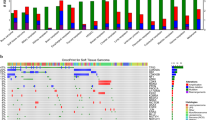Abstract
The p53 gene located at chromosome 17 p13 encodes a MW 53,000 nuclear phosphoprotein which is frequently mutated in many human cancers [1]. The mutant p53 protein has a much longer half-life than the wild-type protein ; the result is a large amount of mutant proteins in transformed cells and tumours. The exact function of p53 protein expression abnormalities in tumour cells has not been completely clarified yet. Several studies have shown that reintroduction of a wild-type p53 gene into p53 deficient cells leads to suppression of the neoplastic phenotype [2]. This suppressor activity may be exerted through the transcriptional control of the proliferation-related genes [3] and/or regulation of DNA replication through wild-type p53 association with DNA replication complexes [4, 5]. It has been supposed that p53 mutations might have a predisposing effect in carcinogenesis and be a favourable event in progression of human tumours. Abnormalities of p53 have been related to the development of various cancers including bladder [6], lung [7], breast [8], colorectal [9] and brain [10] cancer. In this study we investigated p53 expression in human soft tissue sarcomas [HSTS]. The aim was to compare p53 expression with the tumour behaviour of HSTS.
Access this chapter
Tax calculation will be finalised at checkout
Purchases are for personal use only
Preview
Unable to display preview. Download preview PDF.
Similar content being viewed by others
References
Levine AJ, Momand J, Finlay CA (1991) The p53 tumour suppressor gene. Nature 351: 453–456
Finaly C, Hinds P, Levine A (1989) The p53 proto-oncogene can act as a suppressor of transformation. Cell 57: 1083–1093
Raycroft L, Wu H, Lozano G (1990) Transcriptional activation by wild-type but not transforming mutants of the p53 anti-oncogene. Science 249: 1049–1051
Braithwaite A, Sturzbecher HW, Addison C, Palmer C, Rudge K, Jenkins J (1987) Mouse p53 inhibits SV 40 origin-dependent DNA replication. Nature 329: 458–460
Kern S, Kinzler K, Bruskin A, Jarosz D, Friedman P, Prives C, Vogelstein B (1991) Identification of p53 as a sequence-specific DNA-binding protein. Science 252: 1708–1711
Fujimoto K, Yamada Y, Okajima E, Kakizoe T, Sasaki H, Sugimura T, Tereda M (1992) Frequent association of p53 gene mutation in invasive bladder cancer. Cancer Res 52: 1393–1398
Takahashi T, Nau MM, Chiba I, Birrer MJ, Rosemberg RR, Vinocur M, Levitt M, Pas M, Gazdar AF, Minna JD (1989) p53: a frequent target for genetic abnormalities in lung cancer. Science 246: 491–494
Mazars R, Spinardi L, Ben Cheikh M, Simony-La Fontaine J, Jeanteur P, Theillet C (1992) p53 mutations occur in aggressive breast cancer. Cancer Res 52: 3918–3923
Remvikos Y, Laurent-Puig P, Salmon RJ, Frelat G, Dutrillaux B, Thomas G (1990) Simultaneous monitoring of p53 protein and DNA content of colorectal adenocarcinoma by flow cytometry. Int J Cancer 45: 450–456
Sidransky D, Mikkelsen T, Schwechheimer K, Rosenblum ML, Cavancee W, Vogelstein B (1992) Clonal expansion of p53 mutant cells is associated with brain tumour progression. Nature 355: 846–847
Maestro R, Dolcetti R, Gasparotto D, Doglioni C, Pelucchi S, Barzan L, Grandi E, Boiocchi M (1992) High-frequency of p53 gene alterations associated with protein overexpression in human squamous cell carcinoma of the larynx. Oncogene 7: 1159–1166
Toffoli G, Frustaci S, Tumiotto L, Talamini R, Gherlinzoni F, Picci P, Boiocchi M (1992) Expression of MDR1 and GST-π in human soft tissue sarcomas: relation to drug resistance and biological aggressiveness. Ann Oncol 3: 63–69
Porter PL, Gown AM, Kramp SG, Coltrera M (1992) Widespread p53 overexpression in human malignant tumours. Am J Pathol 140: 145–153
Author information
Authors and Affiliations
Editor information
Editors and Affiliations
Rights and permissions
Copyright information
© 1994 Springer-Verlag France
About this paper
Cite this paper
Toffoli, G. et al. (1994). p53 expression in human soft tissue sarcomas. Correlation with biological aggressiveness. In: Banzet, P., Holland, J.F., Khayat, D., Weil, M. (eds) Cancer Treatment An Update. Springer, Paris. https://doi.org/10.1007/978-2-8178-0765-2_168
Download citation
DOI: https://doi.org/10.1007/978-2-8178-0765-2_168
Publisher Name: Springer, Paris
Print ISBN: 978-2-8178-0767-6
Online ISBN: 978-2-8178-0765-2
eBook Packages: Springer Book Archive




